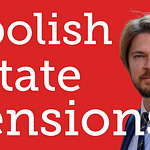In this Institute of Economic Affairs Podcast interview, IEA Communications' Callum Price interviews Dr. Steve Davies, Senior Education Fellow, on the growing crisis of state welfare spending in the UK. Davies explains how the welfare bill has ballooned to approximately 12% of government expenditure (excluding pensions and healthcare), with incapacity and disability benefits alone expected to reach £100 billion by 2030 - up 25% since 2019. The discussion explores how Gordon Brown's well-intentioned income supplement system has created a welfare trap, where means-tested benefits impose effective marginal tax rates of 80% that discourage people from increasing their work hours or seeking better-paid employment.
Davies argues that the current system is both financially unsustainable and socially destructive, trapping people in dependency while failing to address underlying structural problems like housing costs and low productivity. He critiques the limitations of technocratic reforms, explaining how attempts to tighten eligibility criteria often simply displace demand to other, more expensive programmes. The conversation covers the explosive growth in mental health problems among young people and the geographical mobility constraints caused by housing costs that keep people stuck in areas with limited employment opportunities.
The interview concludes with Davies proposing radical alternatives to the current state-dominated system, including a return to mutual aid and voluntary collective action rather than traditional charity or market-based solutions. He advocates for either a minimal state safety net or universal basic services model, combined with locally-controlled, community-based welfare provision that draws on tacit local knowledge. Davies warns that without fundamental reform, the UK risks creating an even more punitive welfare system following a future financial crisis, and calls for honest political conversation about the severity of the challenges facing the current approach to social support.













